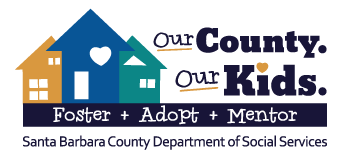Consider Fostering a Teen
Why a teen? Many who think about becoming Resource Families imagine that they will be fostering an infant or a young child. Often the belief is that teens want to age out of the system as soon as they are 18 years of age and they don’t want or need the support of a loving family. This is a huge myth.Take a moment and think back to age 14, 16 and 18. Were you ready to take on the world of college, work, financial aid, budgeting, finding an apartment, and making relationship decisions ALL ON YOUR OWN? Who did you turn to for support? If you answered parents, siblings, grandparents or mentors, then you understand the need for loving homes for teens. Fostering a teen is as important to an older child as it is to a young one, and prepares a teen for adulthood through mentorship, household lessons and experiencing a family’s stability. Fostering a teen allows you to share what YOU know, a benefit that can last a teen for a lifetime.
Research by the Pew Foundation shows that today, more than half of US youth between 18 and 24 years continue to live with their parents and rely on them for both material and emotional support. Yet, we expect the most vulnerable of young adults who are in foster care to survive alone in the adult world. They need parents and families to succeed and thrive.

The Advantages to Fostering a Teen
You can often see the results to the care and stability you invest in a teen in real time. Through your care, you will see older children learn skills and gain experiences they may have never known before: learning to ride a bike, cook, drive, study, and make plans for a job or college, each a building block for their future. You may teach them how to do their laundry and immediately they are able to use that skill to their benefit. Your unconditional commitment to a teen both supports them and our community, as they become emerging young adults, ready to contribute to their own wellbeing and that of our community.

Risks to Teens in Foster Care
Teens in the Foster Care System are extremely vulnerable. Statistics show that 50% of youth aging out of the Foster Care System will become homeless, a large percentage will end up incarcerated and/or suffering from substance abuse. We also know that foster teens are a leading target of human and sex trafficking. Only a tiny percent will actually have received a college degree by the age of 26.
As one of the most vulnerable populations in Santa Barbara County, we need unconditionally committed families who will walk alongside these youth, for the sake of love and community care.

Support for Teens and Foster Parents of Teens
When foster youth turn 15.5, they begin working with their social worker and other mentors to establish realistic and achievable goals as part of their Transitional Independent Living Plan, or TILP. At this age, foster youth also participate in the Independent Living Program (ILP), which helps them build skills needed to live independently and further refine their life goals. Social workers discuss goals for college, employment, housing, and other critical areas with 16 and 17-year old foster teens, and help them make an informed decision about whether they will exit foster care at age 18, or enter Extended Foster Care (more info in the next section).
Extended Foster Care
The experience that defines foster youth culture, more so than any other, is the experience of being displaced from one’s family and loved ones. Without having a healthy attachment with at least one caring adult, a young person is at risk for lifelong personal difficulties. Recognizing that 18 was too young for most young adults to be without support, in 2010 CA Assembly Bill 12 was passed, giving foster youth the option to receive services until age 21.
Older youths who need more time to develop their independent living skills, can reach agreements with the court and their current resource families to continue living with them under a Transitional Housing placement. Under this arrangement, the Resource Families will continue to receive the approved basic rate (plus any other allowable special reimbursements).
Young adults receiving support thorough AB 12 recognize that they need some additional help to navigate school, work, and the many decisions that will affect the rest of their lives. Like other young adults, a youth in the AB 12 program needs a loving home and caring adults that can be a mentor or a guide, or can share a talk with after a tough day.
